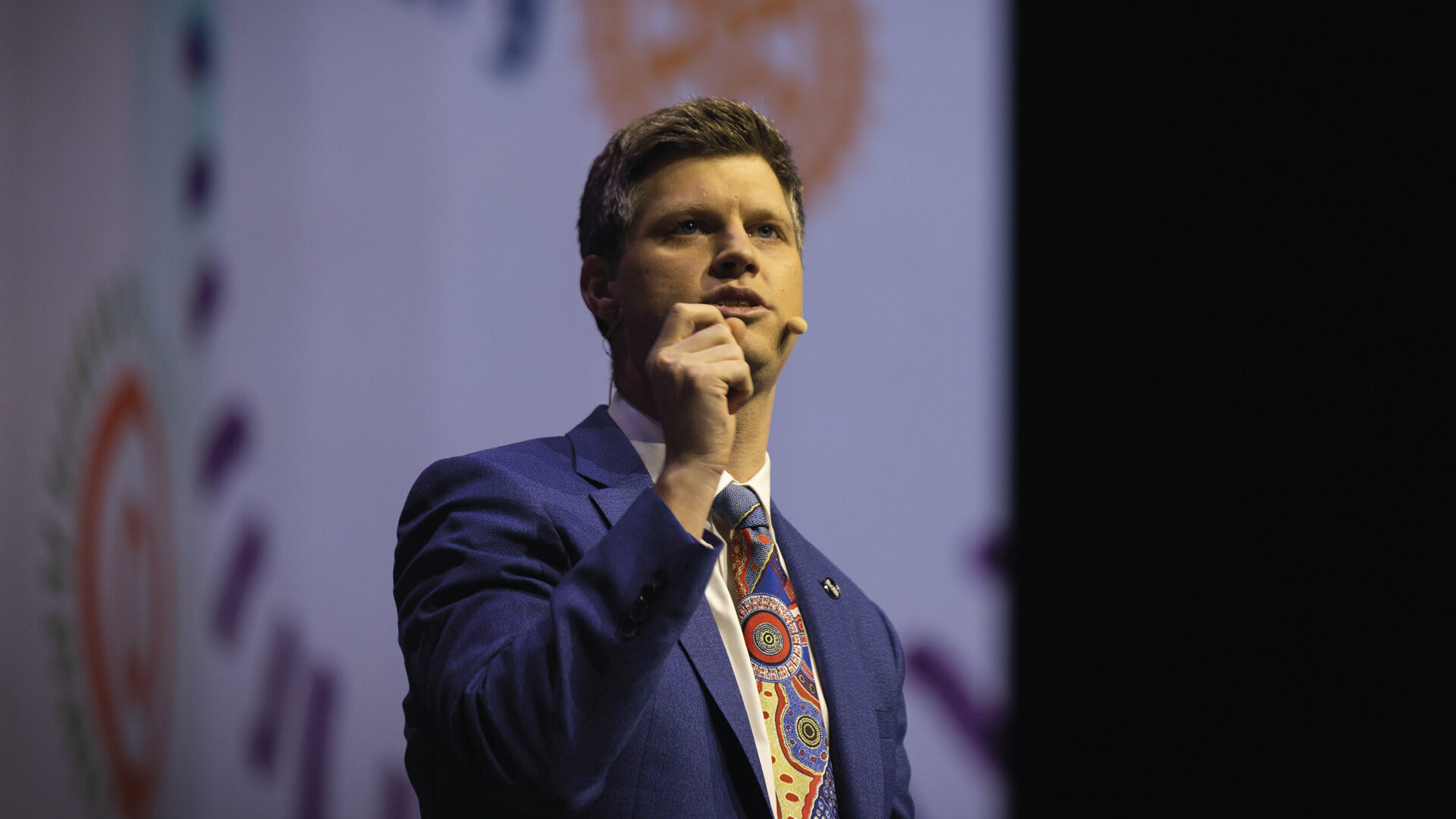Inspired by Western Australian Rotarian David Goldstone, Michael Sheldrick co-founded Global Citizen to pair pop culture with eradicating poverty.
Illustrations by Patrick Morales-Lee
In 2012, more than 60,000 people gathered on the Great Lawn in New York City’s Central Park for a music festival featuring performances from Neil Young and the Foo Fighters. But this festival was a bit different than most. People didn’t secure tickets with money, but with their actions aimed at ending extreme poverty worldwide. The festival was organised by Global Citizen.
Known for its Pop Meets Policy campaign strategy, Global Citizen uses big names in popular culture to engage audiences of all ages in defending the planet, defeating poverty, and demanding equity. The organisation was co-founded by Western Australian local Michael, or Mick, Sheldrick.
As a university student, Mick pondered how to make a difference. Raised in Perth, WA, he started in his home country. He helped organise The End of Polio Concert in Perth featuring John Legend. It was held on the first day of the 2011 Commonwealth Heads of Government Meeting to urge the attending world leaders to commit to polio eradication. The concert’s efforts helped lead the heads of government to pledge $118 million in new funds toward ending polio.
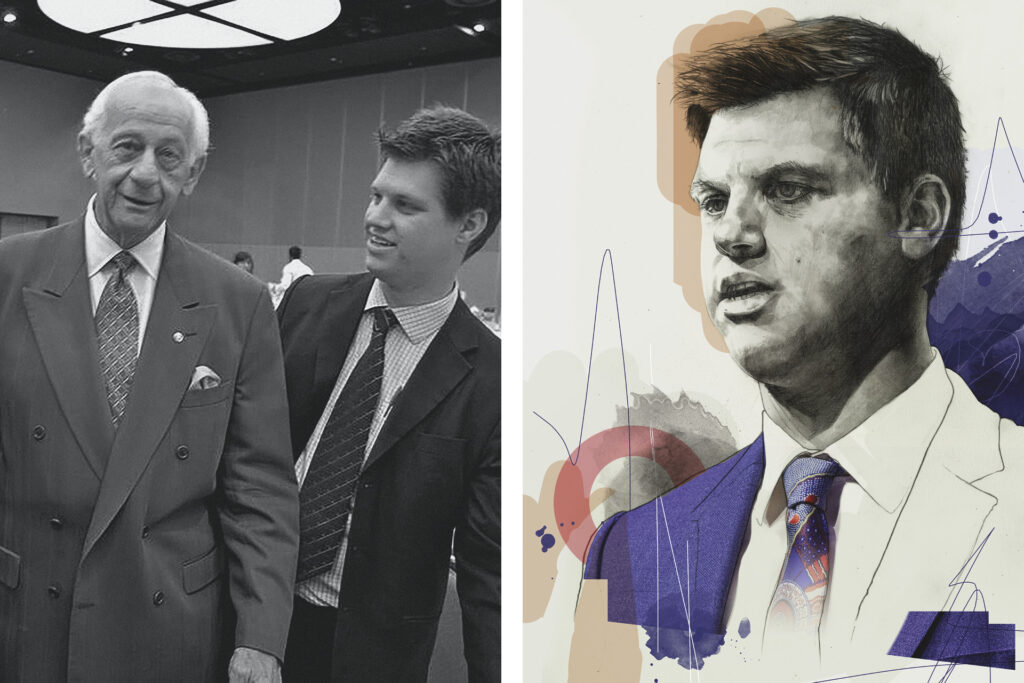
PICTURED LEFT: David Goldstone, left, a longtime Australian Rotary member before he passed away, encouraged Michael Sheldrick, right, in Global Citizen’s formative years to make polio eradication the first cause his organisation got involved in. (Photo: Carol Seidel). RIGHT: Illustration by Patrick Morales-Lee.
Now, Mick is the co-founder and chief policy, impact and government relations officer at Global Citizen. He has helped raise more than $43 billion to end extreme poverty. Since the first Global Citizen Festival in 2012, countless influential artists have graced the stage.
The festival serves as a platform for influential figures, including business executives and political leaders, to pledge significant financial commitments toward eradicating poverty and addressing other critical global issues. In 2022, Rotary’s then-President Jennifer Jones took the stage to commit an additional $150 million to the Global Polio Eradication Initiative on behalf of Rotary International.
In May, Jennifer sat down with Mick to discuss his story, recount the transformative work of Global Citizen, and give a glimpse into his new book, From Ideas to Impact: A Playbook for Influencing and Implementing Change in a Divided World.
Tell me about growing up in Australia and some of the people who shaped who you are today. I know that one of the people who influenced you was a Rotary member.
I was born in Perth, Western Australia, which has the luxury of being paradise on earth. At university, I was involved in advocating for Australia to step up and fulfill its international obligations to help end extreme poverty.
One of the first mentors I ever met with was a Rotarian. We met for coffee by the beautiful Swan River, which is this sparkling river that runs through the city of Perth. He pitched to me why polio eradication should be the very first campaign that Global Citizen – although we weren’t called Global Citizen at the time – should get involved in.
David Goldstone was this gentleman’s name. He was probably one of the best storytellers I have ever met. He had founded the Rotary Club of Crawley, WA, and part of the reason I had met him is he had given scholarships to university students like me so we could get involved in Rotary. We sit down and he says to me, “I want to tell you a story about my friend John.”
John was this healthy guy in Sydney in the 1950s. He was 21 years old and suddenly found he was paralysed from the waist down. At a hospital, the chief medical officer told him, “You will never walk again”.
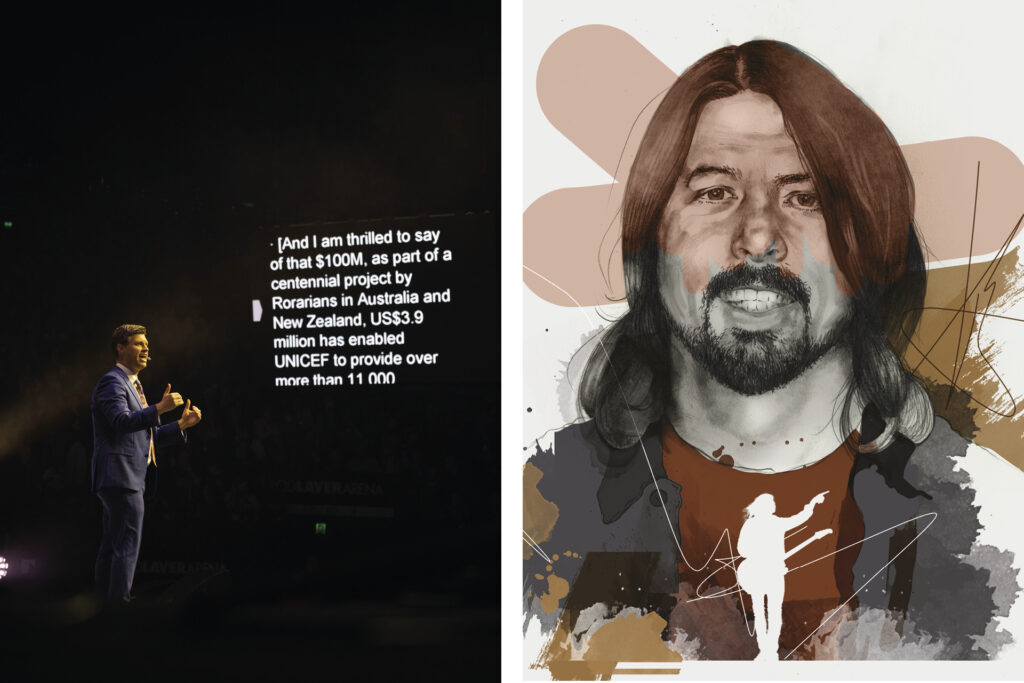
PICTURED LEFT: Through Global Citizens, Mick has helped raise more than $43 billion to end extreme poverty. (Photo: Rhys Martin). RIGHT: When Dave Grohl and the Foo Fighters agreed to perform at Global Citizen’s first concert in Central Park, it encouraged other artists to join in the fight to eradicate global poverty. Illustration by Patrick Morales-Lee.
David recounted to me how John responded with those immortal words: “Yes, I will.” And I know, Jennifer, you’ve met many polio survivors around the world, and you would have heard all their stories. But one of the things that struck me about this one in particular was the resilience. Because John, over many weeks, turning into months, turning into years, slowly recovered the use of his legs and was able to eventually – still with a limp – regain the ability to walk, ended up being a successful businessman, and dedicated himself to eradicating polio.
And at the end of this conversation, I said to David, “Wow, I’d love to meet with him and hear his story first-hand”. And I remember he pulled the chair out next to me, put his leg on it, and he lifted his trouser leg. He was wearing a caliper to help him walk. And he said to me, “It wasn’t ‘John’ all those years ago; it was me. And I don’t need anyone’s pity or shame. I just want to get on and damn well eradicate this disease once and for all.”
It played a formative role not just in my story but, I would argue, in the founding of Global Citizen.
Describe what Global Citizen does.
The founding of Global Citizen was really built on the recognition that issues like poverty, and even eradicating polio, are systemic challenges. A disease like polio has lots of reasons why it spreads. You have a lack of public investment; you have poor sanitation; you have poverty. It was our recognition that systemic challenges require systemic solutions. Throughout history, we’ve seen the power of social movements to make change.
In this day and age, how do we build a social movement to end extreme poverty? We were university students, and it was just after Facebook had launched. It was really combining the power of social media with popular culture and musicians to mainstream these issues, but also give people a way to take action and create impact. We often say that the idea of Pop Meets Policy is fundamental to our core DNA at Global Citizen. We prioritise impact over ideology, action taken over awareness raising.
Getting a musician on board for the first concert that you had in Central Park began as a bit of a dicey proposition. It was the Foo Fighters who started the domino effect. Tell me about that.
We will always be indebted to Dave Grohl of the Foo Fighters because he was the first one to say yes. That was in 2012. We said after the very first festival, OK, that’s it. We won’t do this again. A few days later, we get a call from Stevie Wonder’s management saying he’s always wanted to perform on the Great Lawn of Central Park, and if you do this again next year, he’s in. So I was like, I guess we’re doing it again next year. And that’s where the movement grew. Chris Martin, the lead singer of Coldplay, agreed to be our creative director in 2015 and work with us to take it to different cities around the world from Mumbai, India, to Johannesburg, South Africa, to Hamburg, Germany. The rest is history.
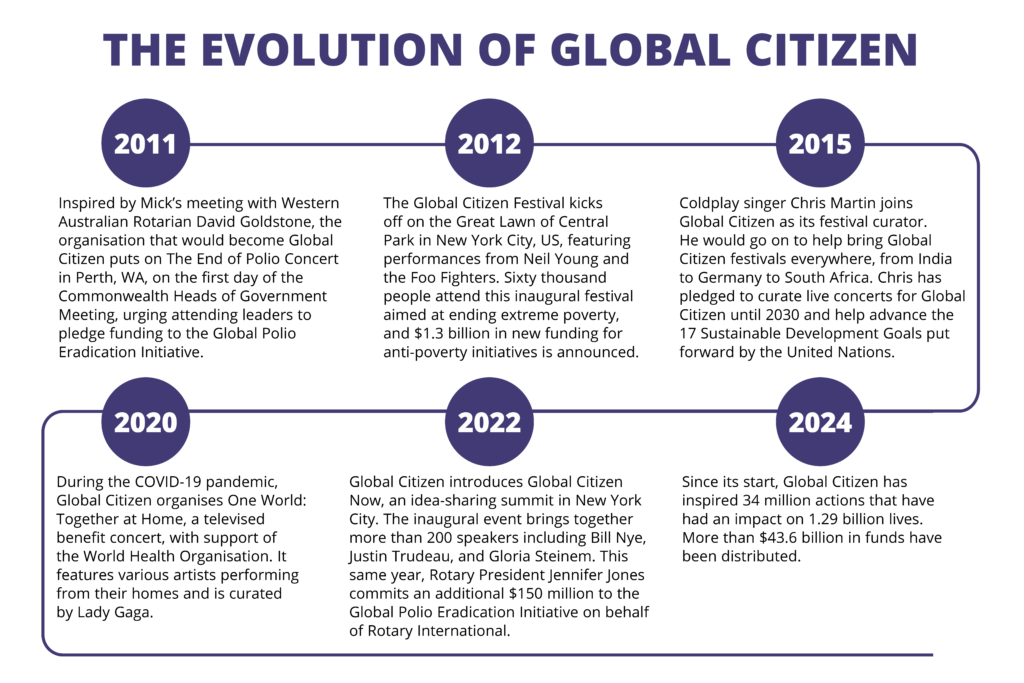
When someone attends a Global Citizen Festival, they actually have to perform an act of service in order to get a ticket, right? They don’t simply buy a ticket?
That’s right. We say action is our currency. We’re after your voice. We’re after you to take action, whether that’s calling on your elected official or business leaders to contribute not just to polio eradication – it could be sanitation; it could be access to education.
And as I write about in the book, if you ask for help and you’re very clear in the impact you want to create, the universe has a way of connecting you with interesting people around the globe. It was this Californian filmmaker, Ryan Gall, who said something to the effect of: “You know what you should do? You should reward people for taking action. Get them to sign a petition, call on Commonwealth leaders to eradicate polio. And in return, they go in the drawing to earn a ticket to your concert with John Legend.”
We had 25,000 signatures for 5,000 tickets. And nine months after that, we had the attention of people around the world. We were standing on the Great Lawn of Central Park for the very first Global Citizen Festival. That was 60,000 people.
And more than a decade later, Global Citizen, with the help of our tremendous partners, is now the largest action-taking platform in the world.
We’ve catalysed and mobilised more than 30 million citizen actions that have helped lead to more than $40 billion being distributed to a range of causes, including polio eradication. That’s helped in some way touch the lives of over a billion people.
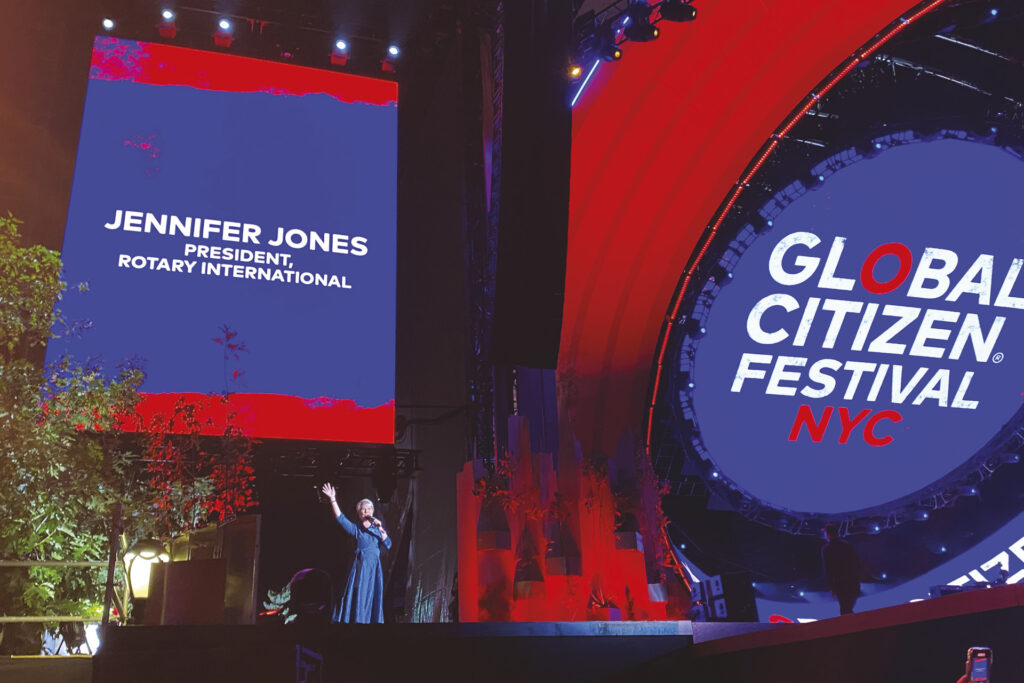
PICTURED: Rotary had a turn on the stage during the 2022 Global Citizen Festival in New York City, US, when then-President Jennifer Jones committed funding for polio eradication efforts on the organisation’s behalf. (Photo: David Alexander)
This interview was adapted from an episode of Rotary Voices, the podcast of Rotary magazine.
Listen at on.rotary.org/podcast.
MAIN PICTURE: Global Citizen co-founder Michael Sheldrick was a guest speaker at the 2023 Rotary International Convention in Melbourne. (Photo: Rhys Martin)
